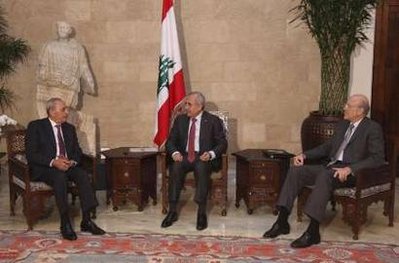Invited by Patriarch Rahi, Christian political leaders from both government and opposition met to talk. The issues on the table were the separation of religion and politics, the defence of Christian-owned land, a greater Christian presence in public institutions, the promotion of the common good, and the collective responsibility Christians have in promoting the values of the Gospel in society. A committee is set up to promote further meetings.Beirut (AsiaNews) – The separation of religion and politics, the defence of Christian-owned land, a greater Christian presence in public institutions and the promotion of the common good “for the betterment of the country, society and government” were the goals laid out by Maronite Patriarch Beshara Rahi at a meeting with 34 Maronite political leaders, from both the ruling coalition and opposition parties, held at the Patriarchal See in Bkerke.
For Mgr Rahi, Lebanese Christians, independently of their political beliefs, have a “collective responsibility” to promote the values of the Gospel and the teachings of the Church in society. “We are here to examine our reality and decide how to improve it, despite [our] different political beliefs, which still follow our values and culture, in light of the teachings of the Church and Lebanon’s special character.”
Maronite Catholic Patriarch Beshara Rai has scolded Lebanese political leaders for their failure to resolve a 4-month deadlock in the formation of a national-unity government. “All of us, Muslim and Christian Lebanese, are looking forward to building a country that we inherited from our grandfathers,” Patriarch Rai said.
Before the meeting, an agreement was expected on two topics, namely the sale of Christian-owned land and the ways to enhance the Christian presence in public institutions. “Christians represent 30 per cent of the public work force. This is inacceptable,” Bishop Salim Mazloum said.
“Only by participating in public institutions can Christians maintain an active presence,” the patriarch said.
Some observers expected members of the ruling ‘8 March’ coalition to cause some difficulties with respect to Hizbollah’s weapons and the international tribunal investigating the murder of former Prime Minister Rafik Hariri. Apparently, the issues were discussed but nothing is known as to what was said.
Still, the first comments following the meeting were positive. Participants also decided to set up a committee to prepare further meetings so that “Lebanon can remain an example of democracy and freedom.”




